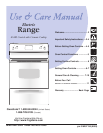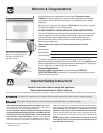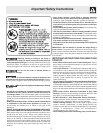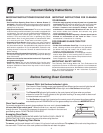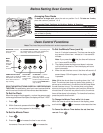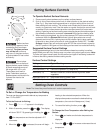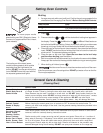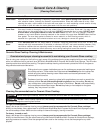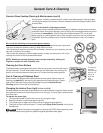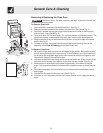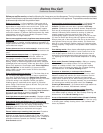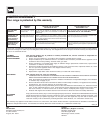
8
Oven Racks
Oven Door
Remove racks. See "Removing & Replacing Oven Racks" under Before Setting Oven Controls. Use a
mild, abrasive cleaner, following the cleaner’s recommendations. Rinse with clean water & let dry. After
cleaning the racks, rub the sides of the racks with wax paper or a cloth containing a small amount of baby
oil or salad oil (this will make the racks glide easier into the oven rack positions).
Use soap & water to thoroughly clean the top, sides & front of the oven door. Rinse well. You may use a
glass cleaner on the outside glass of the oven door. DO NOT immerse the door in water. DO NOT spray
or allow water or the glass cleaner to enter the door vents. DO NOT use oven cleaners, cleaning
powders or any harsh abrasive cleaning materials on the outside of the oven door. DO NOT clean the oven
door gasket. The oven door gasket is made of a woven material, on Self-Cleaning models, which is
essential for a good seal. Care should be taken not to rub, damage or remove this gasket.
Clean stainless steel with hot soapy water & a dishcloth. Rinse with clean water and a cloth. DO NOT use
cleaners with high conecentrations of chlorides or chlorines. DO NOT use harsh scrubbing cleaners. Only
use kitchen cleaners that are especially made for cleaning stainless steel. Always be sure to rinse the
cleaners form the surface as bluish stains may occur during heating that cannot be removed.
Ceramic Glass Cooktop Cleaning & Maintenance
Prior to using your cooktop for the first time, apply some of the cooktop cleaning cream supplied with your new range. Buff
with a non-abrasive cloth or pad such as a 3M Scotch-Brite® Blue Multi-Purpose No Scratch Scrub Sponge. This will make
cleaning easier when soiled from cooking. The special cooktop cleaning cream leaves a protective finish on the glass to
help prevent scratches and abrasions.
Sliding aluminum or copper clad bottom pans on the cooktop can cause metal markings on
the cooktop surface. These marks should be removed immediately after the cooktop has
cooled using the cooktop cleaning cream. Metal marks can become permanent if not
removed prior to future use.
Cookware (cast iron, metal, ceramic or glass) with rough bottoms can mark or scratch the
cooktop surface. Do not slide anything metal or glass across the cooktop. Do not use
your cooktop as a cutting board or work surface in the kitchen. Do not cook foods directly
on the cooktop surface without a pan. Do not drop heavy or hard objects on the glass
cooktop, they may cause it to crack.
For light to moderate soil:
Apply a few drops of the cooktop cleaning cream (cleaner must be recommended for Ceramic Glass cooktops)
directly to the cooktop. Use a paper towel or a 3M Scotch-Brite® Blue Multi-Purpose No Scratch Scrub Sponge to clean
the entire cooktop surface. Make sure the cooktop is cleaned thoroughly, leaving no residue.
For heavy, burned on soil:
Apply a few drops of the cooktop cleaning cream (cleaner must be recommended for Ceramic Glass cooktops)
directly to the soiled area. Rub the soiled area using a 3M Scotch-Brite® Blue Multi-Purpose No Scratch Scrub Sponge,
applying pressure as needed. Once the sponge has been used on the cooktop, do not use the sponge for any other
purpose.
DO NOT use a cooktop cleaner on a hot cooktop. The fumes can be hazardous to your health, and can
chemically damage the ceramic-glass surface.
Before cleaning the cooktop, be sure the controls are turned to OFF and the cooktop is COOL.
Cleaning Recommendations for Ceramic Glass Cooktop
General Care & Cleaning
(Cleaning Chart cont’d)
How to Clean
Surfaces
Stainless
Steel
Consistent and proper cleaning is essential to maintaining your Ceramic Glass cooktop.



